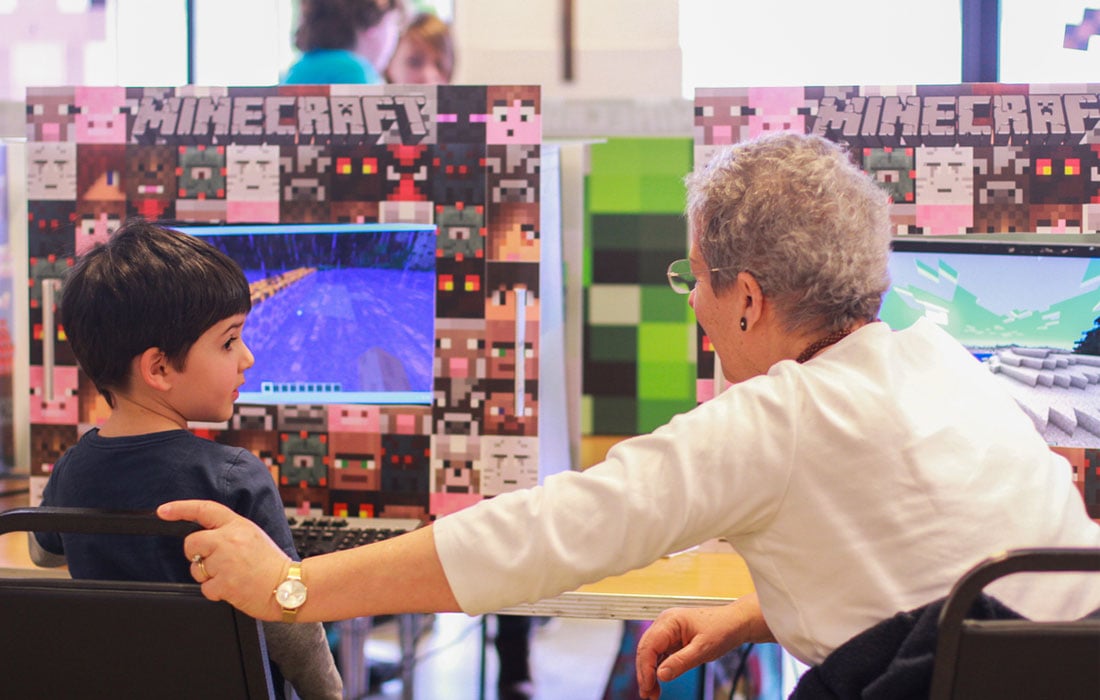
Photo: © Rebecca Dann
Playing for high stakes
Aenne Lotze and Francesca Cross explain how a recent project harnessed young people's passion for online gaming to develop their real-world skills and relationships.
Playing video games online can do a world of good. The positive effects on productivity, teamwork strength, cognitive abilities and motor skills are numerous. One recent study even suggests that regular gaming makes for better endoscopic surgeons and military pilots. But the negative effects of time spent online, particularly on young people, can threaten to outweigh them.
It was terrific to see many young people teach their parents and peers about something they are passionate about
Players have reported a negative impact on their confidence and self-esteem, and feelings of depression. Some also display a lack of social skills: gaming can isolate children from their parents and peers, creating a generational block. How then, as an arts venue, can we tread the line, in order to commit to our young people and support their positive life decisions?
Making connections
Here at artsdepot, we’ve launched a new digital programme to engage young people in positive activities and help them develop aspirations. Connecting the positive effects of online gaming with live experiences (as an arts centre, that’s our bag), we can magnify the impact, and help young people translate their useful online skills and experience back into the real world.
Last year we received funding from the Mayor of London’s Young Londoners Fund to conduct a three-year project with disadvantaged young people from our local communities.
The first phase centres on our show MINE, blending the online construction game Minecraft and live theatre, featuring four young gamers/performers. In the show a mother begins to play Minecraft with her son. Their dynamic shifts positively as he guides her through the game that is so familiar to him: our inspiration for empowering young people and letting them lead our digital projects.
In January we kicked off with a series of Minecraft design workshops in strategically chosen venues and community centres around the borough of Barnet. The aim of the open workshops was to stimulate conversations about Minecraft between parents and children. They were a chance for us to learn how we can create a space where people of all ages and experience can take part with the help of young volunteer gaming experts.
The interactive, intergenerational Minecraft gaming zone ran in our Creation Space throughout half term. Activated by a facilitator and young people, its different stations encouraged visitors to creatively play with Minecraft. The tutorials provided an opportunity for the public to listen to young voices explain what Minecraft is, and engage in conversations new to both sides.
It was terrific to see many young people teach their parents and peers about something they are passionate about. One mother brought her son with Asperger’s, who doesn’t interact with other children often. The patience and communication skills he demonstrated while using his extensive Minecraft skills to teach other children was impressive to witness.
Widening perspectives
As a relatively young team, we like to consider ourselves digital natives. It turns out, being able to navigate an Excel spreadsheet and digital innovation are two very different things. We’ve had to accept that the project is as much a learning curve for us as for the participants. But it was a challenge that led to an opportunity, as we are now working with partners including the National Videogame Museum in Sheffield and GameCity Festival in Nottingham. They’re brilliant in bursting our bubble, setting new milestones and managing expectations.
Did we know before that Minecraft is most popular with under elevens – younger than our original target groups? No. But in the initial Minecraft design workshops, we sought open communication with children about their ideas and their gaming preferences. Not only did this allow us to design the gaming zone to be age-appropriate and genuinely engaging, it also widened our perspective, leading to more video games and other points of interest that will help us engage older community members in the future.
Live experiences
We are working to integrate the digital programme into other branches of our work, connecting it to more live experiences. We are in the early stages of creating a digital youth panel to facilitate further youth-designed digital projects, encouraging involvement, democracy, leadership and governance. The panel will be involved in programming choices and will meet our regular R&D residency artists, including those creating new digital work.
They will also collaborate with our arts programme for the over sixties, encouraging new experiences on both sides. Did you know that a positive effect of 3D video games is that they improve brain capacity and can help prevent Alzheimer’s?
We want to help young people understand the architecture and design of the real world. By connecting their online expertise with our live experiences, we can encourage them to make beneficial decisions offline and online. So let’s play.
Aenne Lotze is Digital Marketing Officer and Francesca Cross is Community Champion, both at artsdepot.
www.artsdepot.co.uk
Tw @artsdepot
Join the Discussion
You must be logged in to post a comment.